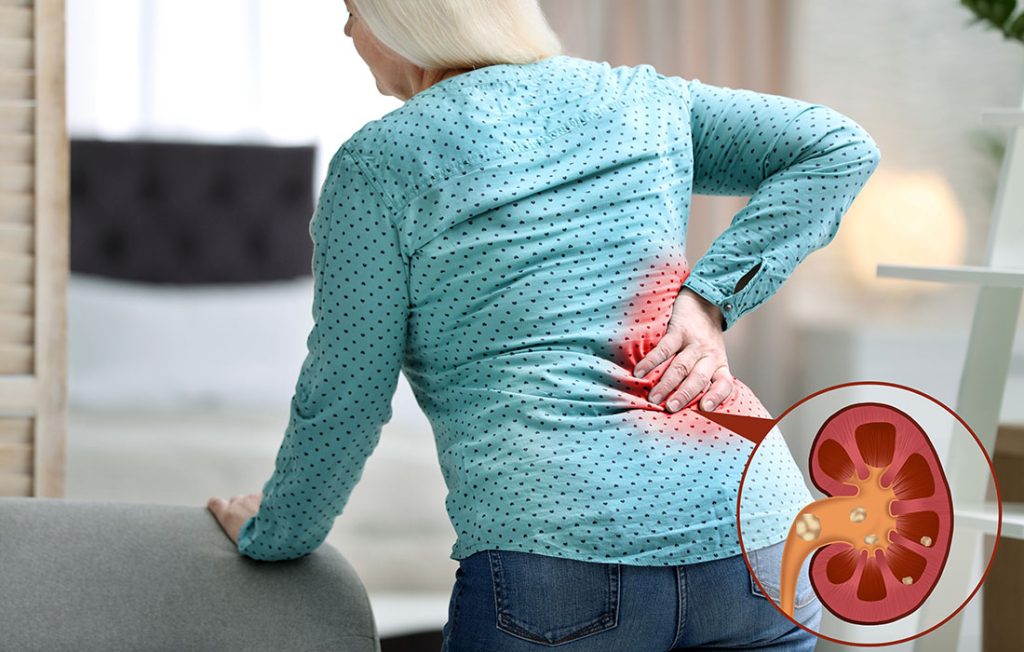Dr Philippa Kaye On Kidney Stones

Dr Philippa Kaye describes options for treatment and prevention of kidney stones, a sometimes agonising condition.
Holly was in pain, and I mean really, quite obviously in pain. She was writhing around in her chair, sweating and gasping with the pain which was in her back but spread round to her groin.
The pain was coming in waves and she described the pain as like the contractions she had had in child birth years earlier.
Her pulse rate was raised (probably due to the pain) and she was clearly very unhappy!
I thought that the probably had a kidney stone and that the contractions or spasms of pain were coming from there as the body tries to expel the stone on its own.
I couldn’t leave Holly in that state, so she went to hospital where she was given some strong pain relief, which made a vast amount of difference, and a scan which confirmed that she had a stone and a treatment plan was made if the stone didn’t pass spontaneously on its own.
What are kidney stones?
Stones can occur anywhere in the urinary tract, from the kidneys to the bladder. Stones in the kidneys are called renal calculi and are formed when the urine becomes supersaturated with minerals or salts such as calcium oxalate or uric acid.
They can be small and gravel like, or large, and the symptoms occur when they move down the ureter on their way to the bladder.
Bladder calculi occur for different reasons, either because the bladder isn’t emptying properly, infection or foreign bodies such as sutures from a previous surgery.
Are kidney stones common?
Stones are actually quite common, about 1 in 10 of us will have one at some point, though many of those will not have symptoms, so we won’t know about it!
Symptoms and risk of kidney stones
For symptoms of acute renal colic, the spasm like pains that Holly was having, it is about 1-2 cases per 1000 people with men being more commonly affected. There are various conditions which increase your risk of developing stones, ranging from anatomical abnormalities of the urinary tract such as a narrowing (stricture) in the ureter, high blood pressure, gout or a family history of stones.
Not everyone with stones will have symptoms, with many cases being picked up during investigations for something else.
Renal colic
Renal colic is the term for the pain felt as a stone moves, causing stretching and then spasm of the ureter, which is the tube connecting the kidney to the bladder.
The pain is often in the loin, or lower back and can spread to the groin or even the genitals, often coming in spasms or waves, there may also be blood in the urine.
There may also be pain on passing urine, fever and nausea and vomiting.
How are kidney stones diagnosed?
Your doctor is likely to perform some investigations to confirm the diagnosis and check that nothing else is going on. This will include testing your urine and blood as well as imaging, generally a CT scan though ultrasounds and x-rays can be used. You will be asked to pee into a cup or a sieve each time as if the stone passes on its own it will be sent for analysis.
How are kidney stones treated?
Not everyone with a renal or bladder stone will have to stay in hospital, this depends on various factors including whether or not you have a fever, how many kidneys you have, how well the kidneys are working and how well your pain is controlled.
Treatment includes pain management in the first instance, as well as anti sickness drugs if required. Four out of five stones will pass on their own but this can take up to three weeks, and patients will be monitored throughout the process, and you must drink a lot of fluids.
If the stone doesn’t come out on its own or you can’t manage the pain there are medications which can help the stone pass. If these don’t work surgery is offered of varying types including shock wave or laser therapy to break apart a stone, surgical removal of stones and/or stenting to prevent or treat a blocked ureter.
Dr Philippa Kaye on how to prevent recurrence of kidney stones
Recurrence of stones is common but there are lifestyle measures you can take to try and prevent this:
- Drink plenty of fluids.
- Reduce the amount of salt you eat.
- Reduce the amount of meat eaten.
- Depending on the content of the stone you may be advised to avoid or reduce foods rich in oxalate (eg chocolate and nuts), or foods rich in urate such as offal.
- Occasionally medication can be given.
Advice given in this article and on the My Weekly website and magazines is not meant to replace personalised medical advice from your doctor. If you have any health concerns please see your doctor.
Article written on January 23, 2020; article reviewed and updated on April 29, 2024
Each week we’ll ask Dr Philippa Kaye to talk about a prominent health issue, so look out for more articles in our health and wellbeing section in coming weeks. Read her advice on Allergies, Parkinson’s Disease, Shingles, Ovarian Cancer, Endometriosis, Long Covid and Ticks and Lyme Disease.






